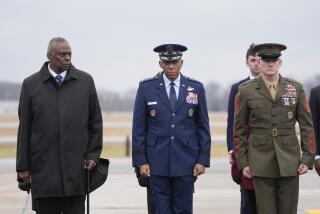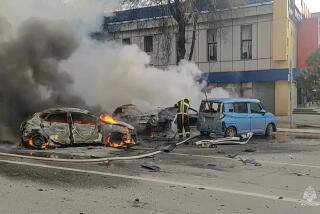High-Tech Army Meets Low-Tech Foe
- Share via
BAGHDAD — The week began with much-ballyhooed dropping of smart bombs and guided missiles, attacks by helicopter gunships and F-16 fighters -- showcases for U.S. technological prowess.
It is winding down with rockets launched from donkey carts in a series of apparently coordinated attacks by insurgents.
Recent days have provided a dramatic reminder that the conflict in Iraq is an asymmetrical battle, in which one side holds all the technological chits but is still vulnerable to a wily foe who knows his terrain and probes for targets of opportunity.
On Friday, insurgents pelted two heavily guarded Baghdad hotels and Iraq’s Oil Ministry with as many as 14 rockets launched from a pair of donkey-drawn carts. Two other such carts were found in other neighborhoods, each carrying weapons that did not go off, officials said.
“There were four donkeys with explosives today,” Brig. Gen. Mark Kimmitt, the coalition’s deputy director for operations, said at a news conference dominated by questions about the novel use of the animals.
The attacks again raised a central question: Can a high-tech army respond adequately to such low-tech threats?
The general dismissed the incidents as “militarily insignificant,” and added, “They’re trying to break our will.”
Soon after the attacks, the usually congested Baghdad traffic slowed to a crawl as U.S. soldiers set up checkpoints, searching donkey carts as well as vehicles.
The attacks occurred about 7:20 a.m. As many as three rockets were fired at the Palestine Hotel; one missed and slammed into the nearby Ishtar Hotel, still commonly called the Sheraton, officials said. Fifteen rockets that had not fired were found on the two donkey carts near the hotel complex and Oil Ministry.
As the rockets struck, panicked patrons tumbled out of the Palestine and the Ishtar, located along the Tigris River and ringed by cement blast barriers, U.S. soldiers and Iraqi troops.
Only one serious casualty was reported, a civilian contractor injured at the Palestine Hotel, where many foreign journalists and U.S. workers were staying.
“Understand that when you’re firing rockets off of a donkey cart, you’re not using the most accurate targeting system available,” Kimmitt said.
Two potential attacks were prevented. A donkey cart was found near the Italian Embassy with 21 rockets aimed at a Kurdish party headquarters, officials said. Another was discovered near the University of Law.
The brazen nature of the attacks, which came amid a much-publicized U.S. crackdown, again underscored the country’s vulnerability to loosely organized cells of armed combatants utilizing guerrilla-style techniques.
The attacks marked the latest innovation in warfare by insurgents here who have inflicted heavy losses with suicide car bombings and the now-notorious IEDs -- improvised explosive devices -- homemade bombs often fashioned from old ammunition rounds and jerrycans that use cellphones as detonators.
On Thursday, a soldier from the 4th Infantry Division was killed by a booby trap west of Baqubah, northeast of Baghdad. Another soldier, from the 82nd Airborne Division, was killed and two were injured by a roadside bomb west of Baghdad.
In Baquba this morning, a car exploded near the main police station, wire services reported. Details about casualties differed, with police saying at least six people were killed and the U.S. military in Baghdad saying 15 were wounded.
Meanwhile, an official at the Baghdad airport said a civilian aircraft on approach was hit by a missile but landed safely, Reuters reported. No other details were immediately available.
Last month, insurgents launched a rocket attack on the Rashid Hotel, just across the Tigris River, which has been used mainly by U.S. military and occupation personnel. One soldier was killed.
Recently, guerrillas have put rocket-propelled grenades -- designed for use in ground warfare -- to use in forcing down U.S. Black Hawk helicopters.
Even Kimmitt allowed some grudging praise for his flexible adversary, though he hinted that the other side may be running out of tricks.
“The enemy wants to use any opportunity he can to get around our security, and he’s an inventive, ingenious enemy,” the general said. “But he has now shown us another one of his tactics ... and I would guess he won’t be using that anytime soon.”
The general also conceded intelligence lapses on the U.S. side -- a seemingly intractable problem that continues to undermine coalition efforts. “A very clever enemy who knows we don’t have the best intelligence in the world will find some seams, will run some vulnerabilities,” said Kimmitt, who added that intelligence gathering was improving.
And the general acknowledged that the donkey attacks represented a kind of public relations coup. “They’re trying to grab headlines,” said Kimmitt. “They realize they can’t attack us and defeat us in a conventional manner.”
The missile assaults again demonstrated the insurgents’ ability to attack heavily guarded targets in central Baghdad, a message soon broadcast across the world -- along with images of the city’s ubiquitous donkey carts and donkeys seemingly perplexed by all the attention.
Early this week, the U.S. Army returned with force to a conventional war mode, dispatching jet fighters, helicopter gunships, laser-guided bombs and high-powered missiles to destroy targets across the country. Commanders said they were getting tough with operations dubbed Iron Hammer, Ivy Cyclone II and Rifle Blitz. However, several of the sites hit by the expensive munitions were empty buildings and open terrain.
Regarding Friday’s attacks from the donkey carts, Kimmitt said they were part of a “psychological game” designed to spread terror and deter people from coming to Iraq to assist with reconstruction.
“The terrorists are trying to ... convince people that they have something to fear by coming here,” said Kimmitt, who added that “the facts on the ground” indicate that Iraq “is a relatively stable country.”
Asked about the condition of the donkeys, Kimmitt quipped, “Shaken, not stirred.... They are under coalition control at this time.”
More to Read
Sign up for Essential California
The most important California stories and recommendations in your inbox every morning.
You may occasionally receive promotional content from the Los Angeles Times.













